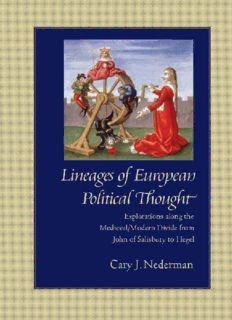
Lineages of European Political Thought: Explorations along the Medieval/Modern Divide from John of Salisbury to Hegel PDF
Preview Lineages of European Political Thought: Explorations along the Medieval/Modern Divide from John of Salisbury to Hegel
Lineages of European Political ought Lineages of European Political ought Explorations along the Medieval/ Modern Divide from John of Salisbury to Hegel Cary J. Nederman The Catholic University of America Press Washington, D.C. Copyright © 2009 The Catholic University of America Press All rights reserved The paper used in this publication meets the minimum re- quirements of American National Standards for Information Science—Permanence of Paper for Printed Library Materials, ANSI Z39.48-1984. ∞ Library of Congress Cataloging-in-Publication Data Nederman, Cary J. Lineages of European political thought : explorations along the medieval/modern divide from John of Salisbury to Hegel / Cary J. Nederman. p. cm. Includes bibliographical references and index. ISBN 978-0-8132-1581-5 (pbk. : alk. paper) 1. Political science—Europe—History. 2. Political science—Early works to 1800. 3. Philosophy, Medieval. I. Title. JC111.N43 2009 320.092'24—dc22 2008042403 For Karen Lynn Bollermann, rough good times—and bad CoNteNt S Acknowledgments ix Introduction. Why Study Medieval Political Thought? xiii PArt I. Historiographies of the Early European T radition: Continuity and Change 1. The Legacy of Walter Ullmann 3 2. Quentin Skinner’s State: Historical Methodology and the Formation of a European Tradition 13 3. Pathologies of Continuity: The Neo-Figgisites 29 4. A Middle Path: Alexander Passerin d’Entrèves 49 PArt II. Dissenting Voices and the Limits of Power 5. Toleration and Community: Functionalist Foundations of Liberty 63 6. The Royal Will and the Baronial Bridle: The Bractonian Contribution 81 7. Political Representation: Modern Theory and Medieval Practices 99 8. For Love and Money: Theorizing Revolt in Fourteenth-Century Europe 122 PArt III. Republican Self-Governance and Universal Empire 9. Brunetto Latini’s Commerical Republicanism 141 10. Marsiglio of Padua: Between Empire and Republic 160 11. Translatio Imperii: Medieval and Modern 177 12. Christianity and Republicanism: Another Look 190 viii CoNteNt S PArt IV. The Virtues of Necessity: Economic Principles of Politics 13. The Origins of “Policy” in Twelfth-Century England 201 14. Economic Liberty and the Politics of Wealth 222 15. Money and Community: Nicole Oresme 235 16. Christine de Pizan’s Expanding Body Politic 248 PArt V. Modern Receptions of Medieval Ideas 17. The Persistence of Economic Nationalism: John Fortescue 261 18. Virtù, Foresight, and Grace: Machiavelli’s Medieval Moments 277 19. Arguing Sovereignty in the Seventeenth Century: Bracton’s Readers 304 20. Hegel on the Medieval Foundations of the Modern State 323 Bibliography 343 Index 369 ACkNowledgmeNt S I never intended to make a career out of the study of medieval political theory. But twenty-five years after I completed a disser- tation on the development of national traditions of state theo- ry in France and England between 1250 and 1350, I find myself still churning the waters of a field of research that continues to be compelling and infinitely rewarding. Many friends and fellow scholars have nurtured me over the past quarter of a century in pursuing this endeavor. The litany of those to whom I owe a debt begins with my doctoral supervisors, John Brückmann and Neal Wood (now, sadly, both deceased), and runs through colleagues of long standing, such as Kate Forhan, Paul Sigmund, Constan- tin Fasolt, Marcia Colish, Walter Nicgorski, Jim Muldoon, Ant- ony Black, John O. Ward, and Constant Mews, as well as of more recent vintage, including Bettina Koch, Takashi Shogimen, Ger- son Moreno-Riaño, and Vasileios Syros. Finally, my colleagues in political theory at Texas A & M—Judy Baer, Lisa Ellis, Ed Portis, and Diego Von Vacano—have been an important source of sup- port and also criticism of many of the ideas contained in this vol- ume. I hold none of the above responsible for my mistakes (which I may perhaps be seen to be repeating in the present book), but I do thank them for rendering my work less error-ridden as a result of their careful and patient appraisals of my scholarship. The impetus for this volume came from David McGonagle, director of the Catholic University of America Press. Dave not only solicited the manuscript but convinced me of the viability of drawing together a series of my investigations, published and unpublished, around the theme of the relationship between me- dieval and modern categories in the history of Western political thought. ix
